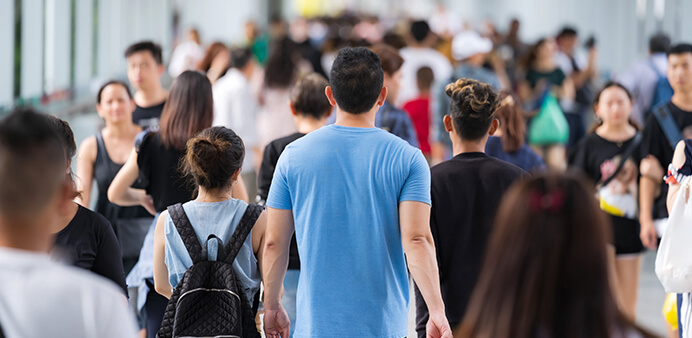
It’s now over a month since so-called “Freedom Day” when almost all of England’s COVID-19 restrictions were removed.
While the easing of restrictions seems to be going as well as it can be—cases, deaths, and patients admitted to hospital have for the most part consistently declined—the virus is still here; COVID isn’t going to go away any time soon.
This is the case for most infectious diseases. In all human history, smallpox is the only example of a disease that has been completely eradicated by a successful vaccination campaign. And while we have strong and effective vaccine protection against COVID-19 in the UK—arguably the best vaccination programme in the world—and are continually making improvements, it’s important to remember that they are not 100% effective.
There are some people who will get ill with COVID-19 despite being vaccinated. There are also others who will refuse, for whatever reason, to get vaccinated, and some people cannot get vaccinated due to underlying health conditions. So, some people will continue to get sick with COVID-19 even when the pandemic becomes a distant nightmare for most of us.
As we all know, variants have the potential to undermine recent success. In the last year, we have seen new variants like the Beta and Delta (formerly Kent and India) variants sweep across the world and become dominant strains.
The Delta variant in particular has been of great concern, with data showing that the vaccines are much less effective against it. Evidence from Israel suggests that the Pfizer vaccine’s efficacy against symptomatic COVID-19 is only 64 per cent down from 95 per cent for variants that were more prevalent in 2020 such as the Kent variant.
Still, the vaccine does reduce the severity of infection which means that hospitalization rates are down by over 90 per cent in the country, but there is the constant worry that a new and more evasive variant could come along at any time.
At a time when all adults in the UK have been offered at least one dose of the vaccine, and at the time of writing over three quarters of all adults are fully vaccinated with two doses, it should come as no surprise that politicians are keen to say that we will never return a level of restrictions like that we had to ensure during three national lockdowns.
Regular lateral flow testing is one of the most effective ways to control COVID-19. This is because one in three people who have an active case of the COVID-19 disease will be asymptomatic, meaning that they will not be displaying any symptoms and could therefore be passing on the virus to other people without knowing about it.
While the UK’s vaccination rate is very high and over 90% of the population now has COVID-19 antibodies, it is still important to regularly test and be cautious. This is because, as we mentioned above, the Delta variant of the coronavirus is much more contagious and is more capable of escaping immunity than previous variants. So, while virtually all COVID-19 restrictions in the UK have been removed and life has returned to relative normality with great success, it’s still important to be careful.
This depends on if you are an individual looking for testing or a business looking to test your employees.
If you are an individual, you can order free lateral flow COVID-19 tests from the government website. That said, some people choose to purchase their own lateral flow tests privately because the ones provided by the government have been criticised for their lack of accuracy while those sold by private providers, such as the Hughes Healthcare Rapid Antigen Test Kit, is much more accurate.
If you are a business, you can no longer order free government tests. This is because the free business lateral flow testing scheme ended on July 19th. This means that businesses that want to continue testing their employees must purchase their own testing kits privately.
Lateral flow tests are only suitable for asymptomatic testing; i.e., testing of individuals who are not showing any COVID-19 symptoms. If you are showing symptoms, it is important to isolate immediately, even if you are fully vaccinated, and book a PCR test through NHS 119.
Lateral flow COVID-19 tests, also known as lateral flow immunochromatographic assays or rapid tests, are simple, non-technical or specialist devices that are intended to detect the presence of a COVID-19 in a liquid sample without the need for specialized and costly equipment. They deliver results quickly and the test can be conducted outside of a clinical environment, making them more convenient and accessible.
Yes—COVID-19 lateral flow test kits that are ordered either through the government website or HandStations are not specific to any one person. They are only activated once used and this means that anybody can use them. They are suitable for use on children, too. It is important to only use one test kit with one individual, however. They cannot be shared or re-used.
If you are showing no symptoms of COVID-19 and have not recently been in contact with somebody who has or potentially has the disease, there is no need for doing a COVID-19 test. That said, however, the whole point of asymptomatic testing is to find hidden cases of COVID-19, so testing once or twice a week if you have been around other people harms nobody and potentially helps protect the vulnerable.
A negative lateral flow test indicates that COVID-19 antigens were not found in the sample that you used. This is a good sign that you are free from COVID-19, but you should continue regular testing if you have potentially been in contact with an infected individual.
No, you do not usually need to self-isolate if you get a negative test result. A negative result means that the test did not find any signs of a COVID-19 infection. Even if you get a negative result, you should still follow the same guidelines as everyone else on social distancing and mask wearing.
You should still self-isolate even with a negative result if:
You should always self-isolate if you have a positive test result. This is the case even if you are fully vaccinated. It is a criminal offence to not isolate when you are aware that you have a positive COVID-19 infection.
At HandStations, we stock a wide range of COVID-19 lateral flow test kits. This includes the Hughes Healthcare Rapid Antigen Test Kit (considered the “gold standard” in COVID-19 lateral flow testing), and the Healgen COVID-19 Rapid Test Kit. These can be used in both private and commercial settings to identify asymptomatic cases of COVID-19.
Both test kits are approved for public use by both the UK government and Public Health England. Each testing kit contains everything that is needed to carry out the test, including clear instructions.
Results are available in just 15 minutes, providing quick and clear testing so that decisive action can be taken.
Emir Limam – E11 Group B.V. Netherlands – Fraudster
24 May 2023When to Take a Test After Covid Exposure?
30 January 2023A Rapid Antigen Test vs a Lateral Flow Test for Covid-19
30 January 2023